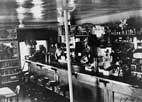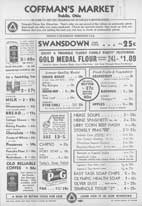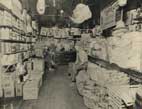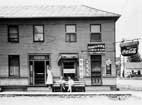


Stores of Old Dublin
The village store was not only a place to buy groceries and commodities, it was a gathering center for gossip and news.
Written by Troy Will and Doug Olesen,
Dublin High School Journalism Class Students, writing for the Shanachie in 1985.
An important part of Dublin’s culture centered around the general store. The general store was the place to go during the weekend for entertainment, but primarily it provided the town with groceries and merchandise. From canned food to nails to harness to seed corn, the store often stuck to the motto, “If we ain’t got it, you don’t need it.” Dublin and the surrounding area stores were good places to “chew the fat” and catch up on the local gossip. And yes, almost every store had a bench out front for tobacco and yard-spinning “loafers” who spent as much time as they could in their favorite perch. In the winter the loafer bench was moved inside around the pot bellied stove. Most of the merchants and the Shanachie staff interviewed had a credit program and still after many years out of the business remember their debtors clearly. “I think raised half of this damn town,” said one store keeper about his outstanding receipts. World War II and the Great Depression brought on a host of hardships all their own for the store owners. Fire ended the careers of three of the stores in the Dublin area and the advent of the modern, self-serve supermarkets finished the rest off.
The following are oral histories told by original shop owners or their relatives.
Madge Shriver
Madge Shriver can trace back store owners in her family for several generations at the 7 and 11 High Street Location (in 2005, this is the site of Town Center I, the southwest corner of Bridge Street and High Street). Henry Coffman III built the store in the late 1830’s, then his son Fletcher took over, then Madge’s grandfather Wray ran the store from 1871 to 1925. In April of 1935 Madge and her husband Harold started a restaurant there to provide meals for the men who worked on the Dublin bridge. They continued as a restaurant until 1945 when meat and other rationed items were hard to get and changed the building into a confectionary. In 1950 they sold their soda fountain and left the food business. The building on the corner of High and Bridge Street was torn down in 1961.
“My grandfather Wray Coffman had a store for 54 years near where the Phillips 66 sits now (in 2005 this is the Town Center I building site). There was a bench in there and the men would sit by the hour. I don’t know how some of those old men made a living! My grandfather had oysters for ten cents a bowl and crackers and ketchup that he’d sell to them. For a nickel you could get an apple or cherry pie in a cardboard container. One day John Wing, who stuttered, and he’d evidentially been drinking and he was eating his pie and pretty soon he said, ‘My golly Wray, this is the toughest pie crust I ever ate!’ And grandpa said, ‘Well, you’re eating the paper plate!’
“Grandfather had an ice house right on the corner all filled with sawdust and ice they cut down at the river. They hauled them up the bank with a horse. They loaded them just like bails (sic) of hay. One time my brother was little and he wanted to go down to the river with them and pick up ice, so mom let him go. He fell in and almost drowned.
“He had a big cooler. They put ice up in the top of it. He sold cheese, bologna, and pop. There was a big counter and if you wanted to eat in there you could. When you walked in from High Street between those two doors there was a dead space. There was a big circle and it had buggy whips hanging off of it. He sold buggies just down the street. There were 30 whips of all sorts on that circle display. On in the store there was always a big bunch of bananas hanging there. One time there was a big poisonous spider in there and it scared him and everyone else until he got it killed!
Grandfather used coal lamps for a while until he got gas lamps. They’d always whistle and he’d have to relight them. Fay Eberly used to go around town and light them outside. There was a big long table that had big boxes of cookies underneath them. There was long display case with trays that were filled with candy. You could get a whole sack of candy for a penny. There was a coffee grinding machine. Along the top of the store were bushels of peaches. He used to go to the market to buy them. Every Friday morning he’d leave before daylight with his springboard wagon and load up watermelons and grapes and peaches down at Central Market at a wholesale place. It was down on Town and Third Streets.
“I grew up in that grocery store. Later Harold and I started a confectionary in the same room my grandfather had his store in. We had a soda fountain and stools in there, tables out front. In 1941 it was really the only place for kids to meet and drink sodas.”
Louis Geese
Louis Geese’s father, Charles, owned and operated grocery stores in Dublin from 1929-1936. Louis helped his father in the stores as a boy. The first store was on the northeast corner of High and Bridge St. (where Domino’s Pizza is in 2005) and the second store stood about where Dr. Carpenter’s office used to stand.
“My dad had all the relief orders for Dublin during the Depression. When they brought the meat and relief groceries up for the people, they didn’t have ice then, they brought it in open trucks and this was fresh meat. They would take the meat and dump it in our garage back there and it was in yellow bags and you could see in July and summertime the paper move for the maggots that was in the inside. People’d come in there and trim that all off and go down and get the good meat out of it. People all had slips and they’d get so much according to how many kids they had.
“When dad had this store down where the doctor’s office used to be from 1930-33, there were three other stores besides his. His was the biggest store. When the bridge was put in in 1934 they had to tear his original store down because they only had a foot of sidewalk.
“Everybody charged their groceries in town, nobody paid cash for them. One guy come in one time and Dad said to him, ‘You ought to pay me a little money this week.’ And he says, ‘Well Charlie I put your name in the hat and I stirred it around and I just grabbed in there and whoever I grab I pay!’ Dad never did get the money! Dad would never say no to nobody. He went right ahead.
“Here’s some prices in 1936: 25 lbs of cabbage 63 cents, one dozen large celery 80 cents, stalks of bananas (50 lbs.) $2.25.
“When Dad had his first store on the corner the Depression was first starting. Back then you couldn’t buy liquor. It was Prohibition time. Those old guys would go down over the bridge and hid bottles of whisky in the spring. Us kids would go down there on the bridge and when we thought they was coming, we’d lay up under there and when they’d hid that whisky we’d wait until they were gone and steal it. Then we’d sell it on Saturday night for 25 cents a quart. There was an old guy by the name of Sam Davis. He worked at city hall and he drank quite a bit. He was our best customer.
“There was this old guy, John Wing who was always sitting up there in front of the store. Now he stuttered pretty bad and the older he got, the worse he stuttered. He could tell you how many steps it took to walk to Plain City, Hilliard, Girls Industrial School and Delaware. He took care of the cemetery and was quite a character. One time he was sitting out front of Dad’s store, there was a bench and everybody set there. And somebody came by and asked John how they could get to the Girls Industrial School. He pointed and said, ‘Gggggoddamnit, go that way, you can get there before I can tell ya!’ Lots of time I’ve seen him working in the cemetery and I’ve seen him hit on a tombstone and say, ‘Gggggodamnit, you’re right where you ought to be!”
“There was an old guy, Bob Porter was his name, he was a colored guy. And he would always come down to the store and there was a round stove in there they would sit around in the winter time. He worked for different people and he was always saying, ‘By golly when anyone gets 50 years old, they ought to shoot him.’ So he was working for this guy and it was Bob’s birthday and this guy came around the store with a double barreled shotgun. He says, ‘By god, you said when anyone gets 50 they ought to get shot!’ Bob took off running!
The same Bob worked for another guy that had horses. And he drove the horses up and around Bethel Road and over to Case road and down to the River Road. He done that to exercise the horses, they were race horses. And he lost his watch one day in front of Jim McCoy’s house. Jim McCoy’s dad found that watch. Well, one night he came in the store and Bob was in there too. Jim held that watch up and said, ‘God dang, I’d like to know whose watch this is, I found it in my chickenhouse.’ Bob says, ‘I never seen that watch.’
“They used to box right out in front of the store. Dublin used to be pretty rough in the ‘20’s. People used to be afraid to take their horse and buggies through Dublin ‘cause they’d get pelted with rocks. In 1929 nobody would ever come through town and we’d fight in front of Dad’s store where the light is now. We’d have on boxing gloves.
Carl Hill
Carl Hill took over his store from his father Willis after he returned from the Korean War in 1952. Carl’s store used to be the old Presbyterian Church first built in 1830. In addition to selling groceries, the store housed the Post Office. The store burned in 1959 and was razed in 1975.
“Back during the Depression, Dad traded a little farm he had up in Summersville for the store. It was August, 1935. We moved down from Summersville and at that time we lived right in the store. There was a $900 mortgage on that store and he went to Plain City to borrow the money so they could settle the estate. I took over the store from him when I came out of the service over in Korea in October 1952 and Thelma and I bought the property in ’56.
“Dad shut down the store during the rationing in World War II. You couldn’t get nothing. They come out with ceiling prices. They were based on the highest price you had sold a product for in a given month. We had always sold at such a close margin, that it was costing more to buy stuff than we could sell it for. He said the heck with it and he locked up and loaned some equipment to the Coles. Dad was shut down 1941 to 1946. Dick came home from the service and done all the painting inside.
“Dad had the post office in there after the war. After I bought the store, that’s all Dad done was be post master. I was assistant. Used to be a gas pump out front. It was the old round gas pump and it had a handle on the side. On the top was one of them glass bowls and ten markers up the side and you pumped it clear full.
“During the Depression they had what they call commodities. It usually consisted of cornmeal, potatoes and cabbage.
“Roger Works was always the last one in on Saturday nights. We closed at ten and we knew until he come in we shouldn’t close. We made lots of home deliveries, usually older people.
“Dr. McKitrick owned the store from 1916-1921 and sold it to John Corbin. In 1912 the tornado took the roof off of it when it was the Old School Pres. Church in Dublin. It was a church from 1857 to 1916.
“Dad and all the merchants would go together and rent films that they showed on Friday or Saturday nights in the streets. The general idea was to increase store traffic. People from New California and out around would attend. On the screen they’d show advertising and over the loud speaker they’d announce specials.
“The store burned down in 1959. We were getting ready to go to sis’ funeral. It was evening and there was a football game going on over here. I had the front door of the store wired so when someone came in it rang a bell over in the house. A babysitter ran to us and said the store was on fire. I was talking on the phone at the time. I looked out and the whole back of the store was on fire. Willie played with matches if he got his hands on them and we think he dropped a match in the shredded paper down in a banana box.”
Catherine Cole
From 1941 to 1967 Catherine Cole’s father Leor and mother Katie ran their South High Street grocery store and lived in an attached house next door. Both Catherine and her brother Ralph were raised in the house. Leor’s motto was, “We got anything you want but automobiles and furniture.” In the early days Catherine remembers big iron horses’ heads with a ring that were used to tie up shoppers’ horses in front of the store. Catherine sold the store and the adjoining house in 1979 and now lives on Longview Street in Dublin.
“My dad went in the store business in 1914. He didn’t buy the place, he just bought the merchandise from John Corbin. He must have bought the building in 1938 or ’39, ‘cause that’s when he started remodeling it. He closed the store in the end of 1967. He said he was going to keep it for a loafing place. Dad used to deliver ice in a Model T Ford up to the Post place on the bend. Dad not only groceried, but he had a Pure Oil pump. He was one of the oldest Pure Oil dealers around. Before dad bought the building, we lived over the store. Two Sock (Oren Brittenham, a handyman) made four rooms and that’s what we lived in until dad bought the other building. By golly, Ralph and I both grew up up there. We were both out of school before dad bought that building.
“I helped dad and mom run the store all the way through. I took and fired the coal stove. We had a potbellied stove and you had to fire it at night or your stuff would freeze. In the summer it was just as bad, we’d be up two thirds of night running fans trying to get it cooled off. Seems like a routine just built up.
“During World War II we had the rationing. Willis Hill’s store closed and they moved their equipment down to our place. So here they come with their brand new scales and slicer and Dad said, ‘What in the world are you doing?’ They said, ‘Well, Mr. Cole, come on, we’re going to show you how to work it!’ Dick and Willis Hill brought them all down. My dad said they wasn’t any nicer people. So Dad always said, ‘If you ever need something, don’t forget.’ Ruth Hill, she was a cute one, used to come down and say that the family needed something or they run out of a food. Dad would just say, ‘Say the word.’ Under his counter he had stuff hid. He’d hide canned pineapple and things.
“You had to have a stamp for sugar and a stamp for meat and gas. Oh that was a mess! Say it was sugar, you had a long stamp and you had to fill these books see. It was like a ledger thing, great big thing with pages. Dad would take them to Hilliard or somewhere so they could count them and check them over. But let’s say you didn’t have a sugar stamp of you needed meat and we had one, then we’d tear out one of our books and we’d throw it in and you could have your meat and sugar.
I sold dog tags and sold Western Union telegrams during the war too. They would telephone them out to us. I took one one day that was a ‘Missing in Action’ for a boy I went to school with, Joe Smith. My dad had to get somebody and go in person out to his folks’ home.
Dad used to say, ‘We got anything you want but automobiles and furniture’. We had a soda fountain in there, too. That counter is up at Human Touch Florist now and if you go in there you can see there’s a hole in it where the fountain went through. I remember when I was little trying to get up there and make my own ice cream cone. At that time there was ice packed all around to keep it cool. We had an ice cream parlor in the north room.
“In 1949 we got the first TV and a lot of people didn’t have one. We put it in the ice cream room. Everybody had their night that they wanted to watch TV. Dad said, ‘OK, the door’s open.” And my, they’d pack in there! Everybody came in and ate ice cream and watched TV. It was just bulging! Dad had to move out all of the tables so just the chairs were left.
“We sold the place in 1978 or ’79. I had to think about it, I really do. I get all fouled up alright. I’m glad they didn’t tear it down, but I don’t want to go in where those doctors is again…It just ain’t right…It just ain’t right…”
John Herron
John Herron owned and operated a grocery store at 32 South High Street in Dublin from 1954-1972. John’s store was the last of the independent groceries in Dublin.
“Way back in the ‘20’s Clark Coffman had my store first, then the Crouses had it during the Depression. I had the store in 1954 for 18 years until 1972. Self-serve was just coming in big in the ‘40’s and supermarkets were starting. Back in the early days stores had long counters back along each wall and the grocer would get items off the shelves for people with lists. The store did real well when I changed it over to self-service.
When TV started, they would give away coupons and our suppliers made sure we handled certain types of foods that were advertised. We had a farmer who had real good chickens and every Friday night we’d go out and get crates of chickens. We’d boil up some hot water and pull feathers off and dress them. Lunchmeat was real big for us, too.
“Kids would come after school and spend lots of money on candy. In fact, we had to have extra help up there then to help keep the nickels counted. Every kid was in there and was in a hurry so they could run back up and catch the bus.
“Once I drove a grocery truck and delivered. You didn’t charge anything extra for it. We’d deliver groceries on Saturday all day long. People really trusted you then and would leave their houses unlocked. Sometimes they’d say, ‘Well, I’ll leave the door unlocked and when you put the groceries in, why you lock it when you go out.’ So you’d put the stuff in the refrigerator and the other up on the sink and go on out.”
Francis Seely
For 105 years the Seely (also Seeley) Country Store was as familiar to Jerome (four miles northwest of Dublin) citizens as their own living rooms. Started in 1870 by H.B. Seely, then son A.L., and finally Thad, the Seely store was still in full operation with its lovely antiques until a tragic fire September 10, 1975. According to Mrs. Seely “there were many wet eyes that day” while over 100 firemen tried to save one of the area’s finest landmarks. Today Mrs. Seely lives next door to the original site of the store.
“The store was here for 105 years. It started in 1870 by Herrick B. Seely. Everyone always said, ‘When you couldn’t find anything in any store around, go to Seely’s store and you’ll find it.’ In years back we sold horse harness, saddles and bridles, then we got into dog and cat and chicken food. We used to take in butter and eggs. Oh gosh, Thad would take in 25-30 cases at a time to Columbus. In those days eggs sold for 3 cents a dozen.
“It was tough during World War II. You couldn’t buy sugar, soap powders, tobacco. Your best friends you tried to slip something under the counter. That was quite a job, I always said I’d surely hate to go through that again. You couldn’t buy any hosiery.
We sold Sohio gasoline. My husband’s father started selling Sohio products when all you could buy was axle grease. They kept it in this old barn out back and when they first started selling it, they’d carry gas up in jugs to put in cars.
“On Saturday night you wouldn’t get out of there until midnight. The women would bring their baskets of eggs and whatever they had to sell or grade. We had ice cream, lace, hose and dry goods for them. The men would sit and smoke. I can remember when they had the old pot bellied stove in the ‘20’s and 30’s and they’d sit around and talk. The loafers’ bench sat out front of the store most of the time and in the winter they moved it into the front inside.
“There was a hand-operated elevator in the back of the store. It had pulleys and you had to pull it up. You could take heavy things from the bottom floor up to the upstairs.
“We always kept ten or fifteen bottles of ‘Seely’s Manna Cordial’ that had medicine in them. H.B. went to Cincinnati and took a six weeks course in being a druggist and came back and made those bottles. That medicine is good for anything—it’ll stop ya or start ya or anything! We used to sell Mrs. Winslow’s Soothing Syrup too. That was for babies when they were cross. I can remember when women would wash on the boards and take all day and if the babies were a little cross, they’d give them a couple drops and they’d sleep all day!
“They had a bin of coffee in the upstairs. They’d get coffee in 250 pound bags and they had these three compartments. It was graded and they’d just grind a pound. It would come down from upstairs in a pipe.
“The store burned down September 10, 1975. Thad’s nephew, Doug, worked at the store. This particular day he couldn’t get his car started so he drove a Ford tractor up. The store had a driveway back to the side where they unloaded things back there. He drove his tractor right alongside the store here and he was working with it. Then he looked down and it was all red, so he jumped off and it exploded. We called them to send a fire truck to put out a tractor fire. I walked into the store a little later and a black man that used to live down over here took hold of me and said, ‘Come on Mrs. Seely, you’ll have to get out of there. The upstairs is all afire and the roof might fall in on you.’ There were over 100 firemen trying to fight it. It’s a miracle it didn’t take the house.
“After the store burned down people wrote us to tell us how much they missed it. About two weeks after the store burned, sixty men on a Saturday came with shovels, trucks and even King Equipment came with a crusher. In one day they knocked down the walls and cleaned it all up. The women fixed a big meal over at the church.
“Mary Jo Edwards, a lovely person, sat outside with me in the car during the fire and wrote this:
At Seely’s
It was always a quarter past eight
At Seely’s General Store.
The old clock in the window
Didn’t move any more…
The light was dim inside,
Footsteps fell soft on the wood floor.
People passed and talked and learned
About now and what went before.
It was kind of comforting to know
In life’s hustle/bustle and roar
That it was always, quarter past eight
At Seely’s General Store.
I like to think of that someday
When there will be no more war,
Or troubles, or sorrows, or crying,
Or hearts that feel heavy or sore.
When, we’d call it timeless eternity
The kingdom, forevermore.
It will be quarter past eight
At Seely’s General Store.
Source: “Shanachie, A Magazine of Dublin Culture and History”, Volume II, Dublin High School, Spring 1985; written by students Troy Williams and Doug Olesen; faculty advisors Scott Weber and Joyce Hotchkiss







